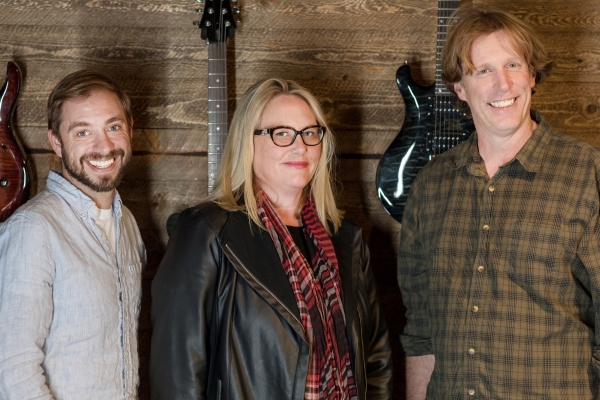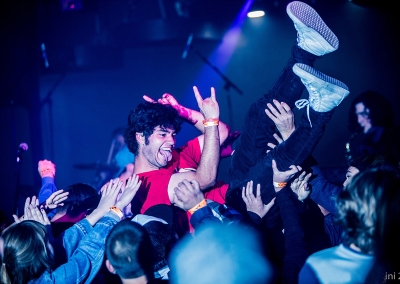For the team at Camarillo, CA live music and educational facility Rock City Studios, service to their community is their primary concern. “No matter what we do here, we want to make sure it’s beyond overkill,” says director Brett DeCarlo.
DeCarlo and co-owner Ann DeMartini don’t lack enthusiasm in their pursuit of that goal. Since purchasing the 350-capacity venue from the previous owners in 2014, they’ve consistently ramped up their services for both the Ventura County musical community as well as touring acts.
One significant thing was lacking, however: a quality sound reinforcement system. That’s now also been addressed with a house system incorporating a combination of Renkus Heinz and K-array loudspeakers driven by Linea Research amplifiers, with a Midas M32 console at front of house. The upgrade makes it easier to fulfill the organization’s mandate and speaks to DeMartini’s original vision of a facility that puts the needs of students and the local and national acts that perform at the venue first.
“I’m not a musician by any means, but I am a music fan,” DeMartini says, adding that she’s spent the majority of her career in business management in the Water Services sector, holds a degree in accounting and currently sits on the Board of the Ventura County Water Association.

That said, she has deep ties to the local music and cultural community, owing to her family’s philanthropic support of the performing arts. She also managed her son’s band – a successful regional act – for five years before taking over Rock City: “The experience from that, from interacting with venues like The Whisky, Viper Room and House of Blues, is what I used to make our venue an experience for musicians.”
As a manager, she saw how music could be beneficial as well as how touring could “make or break a kid,” given what she sees as a huge disconnect between artists, promoters and venues – a gap she’s determined to bridge, if only in her region. “It’s a start, and we might be the venue artists come to and see light at the end of the tunnel, so we treat all bands with the utmost respect,” she adds.
Labor Of Love
When the previous owners of Rock City planned to retire, they approached DeMartini specifically because of her background. In turn, she reached out to DeCarlo, her son’s bass teacher at the time, to come on board.
“I wouldn’t have done it without him,” DeMartini continues, “because I wouldn’t have known what to do. It’s a labor of love and seeing kids getting up on stage for the first time just warms my heart. We want to be that ‘vintage-y’ venue with a high-tech edge to make sure it’s a great experience for the artist and audience. That, and the educational aspect, is my mission.”
Initial renovations and refits that began in 2014 were aimed at making the space, overall, more kid and artist-friendly – renovated floors and electrical, prettying up six existing practice/green rooms, and outfitting a separate enclosed space within the live room as a recording studio.
DeCarlo was instrumental in getting the team together, she adds, and brings extensive experience to his role running the facility and handling bookings, lessons and the studio space. “My parents are both musicians,” DeCarlo explains. “My dad is a producer/engineer and my mom is a Juilliard-trained concert pianist. They wanted me to be a heart surgeon, but I went for music.”
Born and raised in California, the 36-year-old says he grew up in recording studios – from Ocean Way in Hollywood to the Record Plant in New York City – where his father, Lee DeCarlo, worked with the likes of John Lennon, Aerosmith and other high-profile artists.
He began working at studios at age 14 as a runner, kept moving up and spent many years as a professional musician and songwriter, playing bass with his own bands and others on tour and in the studio. “I didn’t study (formally),” he adds. “It was either you practiced for 8 to 12 hours a day, or you didn’t. If you did, then you were a good musician.”
DeCarlo wasn’t fond of teaching, however, and when his mother mentioned that Ann’s son, Matt, wanted to learn bass, he was less than enthusiastic. “I didn’t know Ann and I was hesitant. I never liked teaching because I wanted my students to practice, to try.” His mother reassured him that Ann’s son was truly interested. “So I said, ‘I’ll do it, taught him for a year, and loved it.”
Blended Interests
When DeMartini took over Rock City, she brought DeCarlo on as co-owner/director, and he functions as the resident “Swiss Army Knife.” She adds, however, that front of house engineer/head technical Michael Brown, who came aboard in 2015, “is the number one consultant here for all things audio.”
Brown’s upbringing was a blend of science and art – his father served as an engineer at Hughes Aircraft and pushed the technical aspect while his mother was very musically inclined. “We were formally trained as kids, but I had no musical ability whatsoever,” he says, laughing. “I played drums, my older brothers picked other instruments and my mother taught us piano, but there were eight kids and I think she gave up.”

However, in being exposed to both perspectives, he developed an ear for music and an interest in engineering and went on to study recording at the Sound Master Recording Institute. He worked in studios for several years, but ultimately migrated to other fields of engineering. “For 30 years, it was nothing to do with audio,” he notes.
After being introduced to DeCarlo by a co-worker and getting a bit of background on the facility and its approach, Brown adds: “I was in as much as he would have me. The philosophy of the venue is inspiring and it gave me an opportunity to get back into sound.”
Coming up with educational initiatives is a group effort, DeMartini details, and one that’s based on the needs of the community. It informs private lessons as well as programs that take place in the main room, including Build a Band (where students receive instruction in learning and performing songs as a group), Band Aid (for original acts looking for guidance), and the Local Music Council (a bi-monthly gathering of local talent to discuss the challenges they face.)
But the most important element of their educational efforts is an insistence on turning no one away. “If a parent can’t afford lessons we will figure a way for that kid to learn,” DeCarlo says, adding that they hope to expand into formal audio instruction soon.














